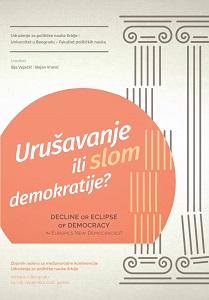Nedemokratske tendencije institucionalnih reformi savremene Italije: berluskonizam bez Berluskonija
Non-Democratic Tendencies of the Institutional Reforms in Contemporary Italy: Berlusconism without Berlusconi
Author(s): Radivoje Jovović
Subject(s): Public Administration, Government/Political systems
Published by: Fakultet političkih nauka Univerziteta u Beogradu
Keywords: Italy; institutional reforms; constitutional and electoral engineering; nondemocratic tendencies; Matteo Renzi; Berlusconism
Summary/Abstract: Italy is facing the potential radical transformation of electoral engineering and the party system, which has been tightly connected to the necessity for the political system reform by the governing Democratic party. The Italian society in a crisis has found itself in front of the choice offered by the current Italian Prime Minister Matteo Renzi, in an attempt to shift the executive power from the unstable and disfunctional domain, caused predominantly by the inadequate electoral systems and perfect two-chamber parliament, to the domain of single-party government within the context of asymetrical bicameralism. The paper deals with the recently adopted electoral system which inaugurates one-party majority in the Chamber of Deputies, the lower chamber of Italian Parliament, as well as with the ongoing constitutional reform, which would significantly reduce the power of the Senate, the upper chamber. With the implementation of these institutional reforms, there would be a dramatic change of the constitutional and electoral engineering in the direction of centralising the power of the Italian executive. The very last phase of application of this idea is constitutional referendum, as a necessary confirmation of the already adopted change in the parliament. The main emphasis of the paper is placed on the analysis of the contents and political consequences related to this institutional arrangement. Focusing on the issues of democracy of electoral regulations, centralisation of political power and destruction of the separation of powers principles, the paper concludes that the analysed reforms have authoritarian undertones. In one particular excursus, it is highlighted that these institutional reforms go along with the general political activity of Matteo Renzi, the initiator of the reforms; that is, that they belong to nondemocratic tendencies close to the political discourse and approach known as Berlusconism. Finally, a potential scenarios are offered, which present plausible results in the forthcoming period depending on how successful or unsuccessful the implementation of the institutional arrangement will be.
Book: Urušavanje ili slom demokratije
- Page Range: 201-218
- Page Count: 18
- Publication Year: 2016
- Language: Serbian
- Content File-PDF

